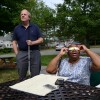I wasn’t on the Red Line a month ago when it derailed, but I easily could have been. It’s my primary subway line — the Harvard Square T is my hub to the transportation routes that go all over the city. For the most part, the MBTA buses and trains get me within yards of my destination or offer the best way to get to places where parking is virtually nonexistent or expensive. I ride the train sporadically, and luckily have missed getting caught in the frequently reported delays and other service-related issues — knock on wood.
However, I’ve heard plenty from other regular riders lately whose experience is a Russian roulette of delays, cancellations, equipment pulled out of service, and other issues. And they’re over it. Some of them are now skipping public transportation all together in favor of ride sharing via apps like Uber and Lyft. And that concerns me, even though I, too, frequently use a rideshare. For me, it’s another option much the same as reading both traditional bound books, and eBooks. The MBTA has admitted weekday bus ridership is already down by six percent — by almost 10 percent on the weekends — though their data doesn’t link the cause to ride sharing. But a recent study by the Metropolitan Area Planning Council does. MAPC revealed that half of the ride sharers in their survey have purchased a transit pass. But they are putting aside their prepaid transit pass, and instead, opting to pay extra for rides with Uber and Lyft.
MBTA bus ridership is down, but commuter train ridership remains robust — possibly because the train routes are still a convenient bargain. That wasn’t the case in Arlington, Texas, where a year ago, the numbers of commuter bus riders took a deep dive. Seeing an opportunity to save the city money, city officials decided to get rid of its commuter buses, replacing them with a ride sharing service called Via. Riders use an app to request the $3 ride and join other riders at designated points and shuttle to different stops. The new pilot program has been running since December, servicing an area around the entertainment district with plans to expand the area to reach 120,000 of the city’s residents. Arlington is the largest city in the nation to forego public transportation. And Mayor Jeff Williamstold CBS News, “It’s a fraction of spending $50 million a mile for light rail.”
I hope the MBTA is paying attention. I don’t want public transportation to be replaced in greater Boston. Not only is it a needed service, but it’s a big part of the city’s character. I’m among those rooting for the return of late night T service, which seems a real possibility again, two years after a pilot program was canceled. And the MBTA is proposing retirement incentives, higher parking fees and fare hikes effective next January to help close its yawning budget gap. That’ll go over better if the service really does get better.
I don’t foresee a time when I wouldn’t use the MBTA, but unless the service is consistently reliable, I can forsee a time I would use it less and less. What I want is for the MBTA to get its act together and realize today’s consumers have other viable choices. And even loyal customers like me will exercise their options.





